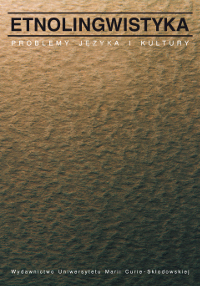Z problemów opisu językowego obrazu świata – pytania i wątpliwości
The problem of the linguistic worldview: a few questions
Author(s): Jadwiga PuzyninaSubject(s): Anthropology, Language and Literature Studies, Applied Linguistics, Philology
Published by: Wydawnictwo Naukowe Uniwersytetu Marii Curie-Sklodowskiej
Keywords: linguistic worldview; values; comparative studies; EUROJOS; colloquial style; establishing semantic features
Summary/Abstract: The author offers a critical evaluation of two articles published in the 21st volume of Etnolingwistyka: Abramowicz, Bartmiński’s and Chlebda’s “Założenia programu ‘A’” [The assumptions of programme “A”] and Grzegorczykowa’s “Punkty dyskusyjne w rozumieniu pojęcia językowego obrazu świata – widziane z perspektywy badań porównawczych” [The controversial points in the understanding of the linguistic worldview from the perspective of comparative studies] – both are concerned with research proposed within the EUROJOS project. A number of comments are offered relating to the data, the subject matter and the goals of the project. The author particularly stresses the need of using mathematical statistics in questionnaires and in textual analyses, an access to a large and balanced corpus and a critical approach to data taken directly from texts, dictionaries and questionnaires. She finds it dubious to give priority to colloquial style, which also includes “low registers”. More important, she claims, than analyzing the objects being evaluated (e.g. home, work, Europe or freedom) is a focus on people’s attitudes and personal values, such as honesty, truthfulness, responsibility, wisdom, courage etc. The author also proposes that the influence of ideology on linguistic utterances be taken into account, as well as underscoring the need for establishing a common definition of value. A typology of value terms is also provided.In the second part of the article, the author relates to the views of Renata Grzegorczykowa. Special attention is paid to the usability of phraseological units, proverbs and derivatives in establishing semantic features, to the status of “reality” (its nature as subject, its belonging to “possible worlds”) and to the understanding of tertium comparationis, which in relation to all kinds of natural objects and artefacts should have the same mental status and be applicable to whole semantic-lexical fields from various languages and cultures.
Journal: Etnolingwistyka. Problemy Języka I Kultury
- Issue Year: 22/2010
- Issue No: 22
- Page Range: 39-51
- Page Count: 13
- Language: Polish

